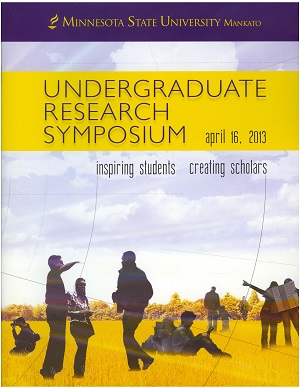Influences of Student Mindset and Motivation on Study Habits and Learning Skills
Location
CSU Ballroom
Start Date
16-4-2013 2:00 PM
End Date
16-4-2013 4:00 PM
Student's Major
Psychology
Student's College
Social and Behavioral Sciences
Mentor's Name
Emily Stark
Mentor's Department
Psychology
Mentor's College
Social and Behavioral Sciences
Description
Mindset consists of how individuals perceive their own abilities (Deweck, 2006); meanwhile motivation involves the drive people have to perform an action (Gillet et. al., 2010). Individuals with a growth mindset are more likely to believe that they can improve their abilities through hard work compared to those with a fixed mindset, which could lead to improved performance. Similarly, intrinsic motivation, which connects to enjoying the activity itself, may lead to more persistence in learning than extrinsic motivation, where individuals are motivated only by external rewards. By examining the types of mindsets and motivations students have for studying and learning, we can gain a better understanding of how individuals face challenges and the effects that has on their performance (Dweck, 2006). In the current study, 172 participants completed measures of critical thinking skills, GPA, beliefs and attitudes toward school, superstition, logical thinking, the extent to which they are intrinsically motivated to do well in school, and the extent to which they believe intelligence can be developed with hard work (growth mindset). Results found that intrinsic motivation positively related to growth mindset (r = .19, p < .02). Additionally, these two concepts did relate to participants’ attitudes about school, but not their GPA or critical thinking skills. We discuss why it may be important for students to develop intrinsic motivation and a growth mindset, and how that can influence their success in college.
Influences of Student Mindset and Motivation on Study Habits and Learning Skills
CSU Ballroom
Mindset consists of how individuals perceive their own abilities (Deweck, 2006); meanwhile motivation involves the drive people have to perform an action (Gillet et. al., 2010). Individuals with a growth mindset are more likely to believe that they can improve their abilities through hard work compared to those with a fixed mindset, which could lead to improved performance. Similarly, intrinsic motivation, which connects to enjoying the activity itself, may lead to more persistence in learning than extrinsic motivation, where individuals are motivated only by external rewards. By examining the types of mindsets and motivations students have for studying and learning, we can gain a better understanding of how individuals face challenges and the effects that has on their performance (Dweck, 2006). In the current study, 172 participants completed measures of critical thinking skills, GPA, beliefs and attitudes toward school, superstition, logical thinking, the extent to which they are intrinsically motivated to do well in school, and the extent to which they believe intelligence can be developed with hard work (growth mindset). Results found that intrinsic motivation positively related to growth mindset (r = .19, p < .02). Additionally, these two concepts did relate to participants’ attitudes about school, but not their GPA or critical thinking skills. We discuss why it may be important for students to develop intrinsic motivation and a growth mindset, and how that can influence their success in college.
Recommended Citation
Sieberg, Sarah and Angela Graske. "Influences of Student Mindset and Motivation on Study Habits and Learning Skills." Undergraduate Research Symposium, Mankato, MN, April 16, 2013.
https://cornerstone.lib.mnsu.edu/urs/2013/poster-session-B/18




